Get notified when new episodes of TheSEOFreelance podcast go live
Introducing Steve Toth
Steve Toth, the author of SEONotebook.com, has been in the SEO industry for ten plus years and freelancing full-time since 2020. Steve reached out to me after reading my interview with Eli Schwartz and we quickly got a call on the schedule.
In today’s podcast, we talk about Steve’s journey from entry-level copywriter to freelance consultant making many multiples of his old salary. If you want to learn more about starting off as a freelancer, value-based pricing, utilizing LinkedIn to get clients, and even hiring for help then you won’t want to miss this podcast episode!
Steve’es Book Recommendations - no affiliate links.
The go giver & Million-dollar consulting
How to connect with Steve Toth
Sign up for Steve’s weekly email: SEONotebook.com
Connect with Steve on LinkedIn
If you are interested in being a future SEO Freelancer podcast guest? Please email me directly at Nick@nickleroy.com
Podcast Transcription
Nick LeRoy 00:00
Welcome to the SEO Freelancer podcast. I'm your host, Nick LeRoy. And today I am talking to freelancer, Steve Toth, who made over $40,000 A month while he was working full time. Let's get right into this. Hey, Steve, how's it going?
Steve Toth 00:18
How's it going, Nick? Well, it's been a while since I've worked full time. But at the time I was doing that. But it's been about two years now that I haven't done
Nick LeRoy 00:26
that. Yes, absolutely. So today, just to be clear, we're gonna be talking about a time when he was bringing in significant income while maintaining his full-time position. So Steve, let's start. Can you give us a little bit of an introduction? You know, what's a brief description of your background? And how long you've been freelancing?
Steve Toth 00:46
Yeah, sure. So I've been in SEO since about 2010, started more as a blogger, and then just got a job at an SEO agency actually being more of a Content Manager role. But, you know, those things are pretty closely linked. So I started blogging about SEO, you know, even before I was really doing it, just because I was so interested in it, this was back in like 2010 2011. And, you know, quickly realized that that's what I wanted to be doing. Got to ask tons of questions to the SEO folks like who, you know, have been having more experience at that agency every day and just quickly accelerated my knowledge to the point where I became the SEO director. And then just tucked between a couple of agencies got laid off, and then got a job at FreshBooks, which was definitely sort of a launchpad for me, grew their organic visits to over 50,000 visitors a day, and ranked for keywords that had ranked number one for keywords that had 300,000 search volume. So basically did really well at FreshBooks. And when I left that company, I was actually hired as a consultant by them. So they were one of my first clients when I broke out on my own.
Nick LeRoy 02:07
Wow, that's fantastic. And I know you kind of gave us a little bit of a walk through already of your career. But do you mind sharing a little bit more specifically about that? That first copywriting job? I think you said was 2010. And maybe what your salary was getting?
Steve Toth 02:22
Oh, yeah, for sure. So I was a copywriter at a web development agency called Web Canada, they are no longer alive, but they actually rebranded a while, but I think they sold that company. And that was just a web copywriter for them. And that was making 30k a year. And I remember, like, I was basically put in charge of using, sorry, launching their blog. And one of the first blogs I ranked was How long should I wait to redo my website? So it was like, redo your website was, was was the keyword and, you know, I just put it in like seven times, and boom, I wrecked and I thought it was so cool. And I remember like showing my boss and they're like, yeah, that is really cool. And, and from there, like it was just kind of like, you know, I can do I can keep doing this. So basically, you know, that that time this was, yeah, 2010 2011 and 2012. I think SEO was a really exciting time back then is I mean, just as it is now, but this was sort of the Matt Cutts era of SEO and this is when, you know, Panda and Penguin were first released. And those were like, you know, I would say Google's two big blows to the SEO industry in terms of changing, you know, how business was done. Like, quite significantly. So it was really fortunate to be a part of that, at that time, and like witnessing that big shift, you know, in the sort of 2012 2013 era.
Nick LeRoy 04:01
Just to be clear, Steve is from Canada. So 32 is even a little bit less if you were to convert that to US dollars.
Steve Toth 04:09
It's pretty pathetic.
Nick LeRoy 04:12
Which was funny because my first job raised about that same area 2009 was $32,000 us for kind of a similar role of brought in to teach myself SEO.
Steve Toth 04:25
But you know, what was actually interesting Nick, at that time, in 2011, there was parity between the US and Canadian dollar. There was actually this remember, I bought a very expensive pair of headphones and I was like, Man, I got such a deal because the dollar was the same.
Nick LeRoy 04:44
I love that. You know, fun story real quick. My very first paycheck I won't forget it simply because it was $1,111 I used to buy a flat screen TV because somebody had told me once you know this will feel like the most money you've ever made because as you get older You'll just have more responsibilities. So, yeah, isn't it kind of funny how we look back? And $32,000? You know, kind of felt like a blessing at the moment? And now, maybe not quite so much.
Steve Toth 05:11
Yeah, you can make that month pretty easily, I would say, as a freelancer.
Nick LeRoy 05:17
So you mentioned that your last job before going off for you freelance full time was at FreshBooks. Do you mind sharing what your final salary was there? So kind of making the difference between 10 years starting point to 10 years later?
Steve Toth 05:31
Yeah. So just to give you an idea, like, I was doing really well, I'll just backtrack just a little bit before that. I was at an agency and it was a good gig. And I was actually earning commission, because I had created several new services at the agency. And for one reason or another, I won't get into the minutiae, but I just knew I had to leave. And they offered me around 100k to stay. And and I ended up declining it and making more of a lateral move to a different agency that then laid me off. So I was like, Okay, well, I have gotten, you know, I've got no job. So I'm much more open to different offers. And when I started at FreshBooks, it was 75k. Canadian a year. And then I got one raise 280 K, so wasn't a whole lot. And I knew like the value that we were bringing in, we had 10. Next our free trials, throughout SEO and, you know, getting a raise at a company like that is not based on performance. It's more based on how you play the game. And I wasn't playing the game as well as some other people. I don't think,
Nick LeRoy 06:45
Steve, I think you and I can be the not playing the political game, correct club, because that's kind of a big deal. On my side. As some people I have seen with my own story, I got a $10,000 raise, and then was like go a couple of weeks later, during COVID. But still, it shows you that you know, performance is only worth so much. And yeah, the politics behind it. I was an easy one to cut off evidently.
Steve Toth 07:13
Well, the raises come by committee, right? So they basically have everybody's name on the board and all the directors vote on who they think they should get the raise. So if you're not popular, and you've never spoken to half the directors in the marketing department who are voting on that, you're never going to get it. Right. How
Nick LeRoy 07:31
are you going to make that case for yourself? When maybe three of the five people in the room know your name?
Steve Toth 07:38
Yeah, it didn't, it didn't really matter in the end. But yeah, it was just it was, yeah, it feels it feels like a slap in the face of the time. Because, you know, like the, at least in my case, I knew that the contributions I was making to the company was significant. But it was also interesting, because this was around the time that like that we had cycles for each raise. And the time that I really thought I was going to get one because our we were performing so well, I didn't. But at the same time, like this was like September 2019. At that time, I was probably making around 15k through my my freelance business, and then by the time I left FreshBooks, I was making significantly more than not.
Nick LeRoy 08:22
And let's jump into that, because as we know, from the title of this podcast, when you were working FreshBooks you were freelancing as well, and bringing in basically half your salary every single month. So can you walk us through a little bit of what that, you know, what's that process? Like? I mean, obviously, from $1 perspective, it's pretty enticing to leave the nine to five, but walk us through just a little bit what it was like juggling full time and freelance and what was the final moment where you're like, I'm done. I'm just going to work for myself.
Steve Toth 08:55
Yeah, I think also like worth mentioning, just like how it all started to write. How did I go from like having one very small lawyer client to suddenly like three really nice paying clients for that at that time. That was about you know, September 2019 It was about 5k a month and at 5k per client per month. And so what I basically happen was we had ranked number one for invoice template and that was the big keyword that we were going for and we finally did it right didn't know how long it was gonna last ended up lasting just under two years but we ranked number one and I we were on our way to an escape room just for like a team outing. And and I just posted on LinkedIn like oh my god, like we've ranked number one for this keyword. Thank you, Chris Wesley and like all the people who contributed and I really didn't think anything of it. I press post and then went to the escape room and then Um, I got two leads out of that. And each of those were, one was, I think 7k. And then the other one was like 4k, per month. And then I started working on those two clients based off of that one LinkedIn post. So it just showed me the power of LinkedIn first and foremost. And this was also right around the time that I started SEO notebook. So you know, having those two clients plus that criminal lawyer that I was working on, started to like, really be like, wow, like I can make much more than I'm currently making it. I have my job. And, you know, maybe if I just keep on doing these LinkedIn posts, maybe I can get some more clients, right. And, and this is also the time where I launched yet SEO notebook, and about two months into my newsletter, where I just email out one piece of strategy each week, I had about 1000 subscribers. So it also started to provide leads as well. And actually today, I would say that I get most of the inquiries through my website. And maybe it's like an ad, maybe 7030 split between my website and LinkedIn these days. And sorry, you had some other questions here as well. But I kind of just went a little bit into the to the past a little further than
Nick LeRoy 11:24
that. No, that's super helpful. And first off, I'll just say, everybody, definitely go check out Seo notebook.com. It's an email that I appreciate getting each week. And as someone who also sends out an email each week, you know, through the SEO for lunch, I can, you know, say pretty much the exact same things, it's an amazing opportunity to get your name out there be able to spread some really good information. And it's kind of a constant opportunity to pitch your services and your brand. It's no surprise at all that you found so much success with that.
Steve Toth 12:01
Yeah, anybody? Did they the key is consistency. And you'll say the same thing, right? Nic like you have to be sending weekly, you can't, you can't let it slip. I know there's certain people I won't name any names, but like people start newsletters and then stop them. And then like really like, just don't keep them up and they don't do anything. And I just got that advice very early on is like if you don't be if you're not sending weekly, then people are simply going to forget who you are.
Nick LeRoy 12:33
And that's so true. There's I will out one person because he's a buddy of mine, but like Sean Marquis, like he has a really good newsletter that I've always appreciated. He's kind of snarky, and to the point. And he was really good for a long time. And I gave him a bunch of crap, because he's kind of stopped and put it back together. And yeah, it's just all about what you're prioritizing at the time. But I think similar to you, Steve, like I've been writing the SEO for lunch for five years now. And you know, I have 5500 subscribers, and it's just now I don't want to let anybody down. They the people that I've talked to have told me it's important to them. And selfishly, it's a good opportunity to get my name brand out there. And I suspect you see the same value. And you probably have a similar routine for SEO notebook as well.
Steve Toth 13:19
Yeah, usually Fridays, I put everything together. Okay,
Nick LeRoy 13:23
yeah, mine is Monday. That's like, I don't have the patience to be able to do it out of
Steve Toth 13:28
yours is a little different. Because you've got to get like breaking news, right? So but for me, like I'm just literally like, I'm noticing things in my own work. Or I'm noticing a thread on Facebook or Twitter on LinkedIn, that has some interesting knowledge. And I'm just taking one piece of advice, like my emails could literally be like three sentences, and just telling you to do something, right. So like, it's a little bit different than the curation that you that you'd have to do.
Nick LeRoy 13:58
Right. But I think similar to SEL, yeah, it's not the quantity of words. It's the value of the words, right?
Steve Toth 14:04
Hopefully, yeah. People like it. 12,000 subscribers
Nick LeRoy 14:07
in which is just crazy. Yeah, that's awesome. Congratulations on that milestone seemed like just the other day, I was congratulating him 10,000. So let's race to 25 and see who gets there first. Let's see.
Steve Toth 14:21
Maybe we could combine our lists.
Nick LeRoy 14:24
Later, we're coming after you Stephen deck. I think the last part of that question, then we'll move on is, obviously you've got these clients, they're paying pretty well. Hopefully, they're making you happy as well as you are them. But what was the tipping point for leaving FreshBooks? Like you obviously made a commitment at one point in time that full time work is no longer of value to you.
Steve Toth 14:51
Yeah, so I got some advice. That was basically it's super valuable if anybody's in this position. Don't leave your job until it's costing you money to stay in your job. So what that means is, if you can float both things at the same time, go to go to your nine to five, come home, have dinner, maybe spend an hour or two chilling, and then go back to your computer and do your work and make it all manageable, then keep doing that as long as you can, because you're going to build up some savings. And when it gets to the point of I've got people knocking at my door, and I've either got to tell them no, or tell them yes, and then quit my job. That's the point when I did it. And what I actually ended up doing in I guess, January, February 2020. Right before COVID was a took on all this business, I asked FreshBooks if I could go down to two days a week, they told me, If you want to be an employee, you've got to work three days a week. But if you want to go on contract and become a freelancer, we can we can basically do two days per week. And once I got the approval from them, I ended up taking all of my vacation days in my last month, because I needed the time to work on these new clients. And then yeah, my first day as a full time entrepreneur, was March 2 2020, about two weeks before we all got locked down. So I was pretty nervous at the time, I didn't really know what would happen. I had two clients cut their budget in half, just out of sort of caution. One of them ended up raising it back up the other one stayed at that that level. But pretty soon after, I would say like, you know, April, May, things really started to tick up. And and business has been great ever
Nick LeRoy 17:02
since. I love hearing that. I mean, especially like I said, you and I had started really at the same time you kind of in March and myself in May. And you know, I think it sounds like both of us have been very fortunate that business has been good. You know, obviously some ups and downs, but very much largely in the positive. So I'm super pumped to hear that, you know, thanks, man. Awesome for you. Congratulations. Yeah, thanks. It's been
Steve Toth 17:29
cool. I really never expected it to move as fast as it did. But yeah, move pretty fast.
Nick LeRoy 17:37
I agree with you, literally, my first goal was I always kind of joke with my wife, it was like, this is a survive year, if I can make 90% of what my old salary was, I was gonna be really happy. Unlike what you were kind of saying. And I would agree 1,000%, like, definitely come up with a little bit of a savings plan and a runway and get this line of, of leads before you go out full time. But I didn't have those and it always turned into you know, we're gonna pay this month. And then we're gonna go into this next month. And before I know it, that's where it kind of based the story that I wrote about my freelancing experience. Like before I knew it, I made my entire salary back, and almost doubled it within eight months. And it's just amazing. When you commit to SEO, and you have the right skill sets, you know how much just of your time you can get back and how valuable it is just even from $1 perspective.
Steve Toth 18:33
Yeah, for sure. I mean, even like four months before I left FreshBooks I was an incorporated company, which I found kind of cool. At the time walking around, walking around those halls and like making more than every executive there was quite a surreal time.
Nick LeRoy 18:53
And isn't that really neat, though? I mean, you don't have to be this company with a massive corporate office and private planes to be a company. I mean, similar to you, you know, I was freelancing part time and I had become an LLC. And, you know, I had even picked the dorky name backbreaking SEO, which now I have my DBA as you know, Nick Leroy consulting, but it's fun to just set it all up. Yeah, it take taxes a little bit more seriously. And you're a business like this is a real deal. And it's very exciting.
Steve Toth 19:29
Yeah, I mean, like, when I was working at FreshBooks, and we were servicing Small Business businesses, we used to say, Oh, we wanted to go after like the scaling segment, right. And even like back then in my mind, like scaling was like, you know, $10 million dollar company, but didn't realize that like, you know, a single like person company, you know, with some contractors can be a million dollar or $2 million company and they don't care about Spending $100 a month on invoice software?
Nick LeRoy 20:04
Yeah, and that's the other thing, you know, we can talk about, you know, your comparing the revenue from second year to your first year, you know, you made a substantial jump. And I suspect part of it goes to just what you were saying it's more value based pricing, you know, when you're able to take your skill sets, and have these company make multiples of their revenue, you know, why should you necessarily tie yourself to an hourly rate? So I guess on that note, I just be curious, what what feedback do you have on that aspect? And what has contributed to your success in what has been a relatively short, you know, full time SEO, freelance career?
Steve Toth 20:41
Yeah, the hourly rate things like interesting and like, I know that we share a common connection, and Eli Schwartz who, who wrote product, lead SEO, and Eli's a guy who I actually met, while I was still working at FreshBooks, he was introduced to me by somebody else, who we both knew. And he was, he's been such an awesome, like, very casual mentor, but like, the information that he gives me is great, and like always, actually spoke with him yesterday. But, you know, going to that, like value based pricing piece, you're, there's so much leverage with SEO. You know, you can literally say to a client, like, Hey, I think you should write, you know, 150 blogs, and this is why I want you to do it, then like, here's my example. So I was working for an online education client. And they saw really expensive live courses for things like learning Python, web development, product management, stuff like that. And I said to them, like, and I was actually billing this client, Hurley. And I said to them, that this is the time 2020. Right, when I sort of started, and I said to them, Why don't you for each discipline that you have? Why don't you come up with like, why don't we come up with, like, say, 1520 questions that people ask, when they're evaluating this type of career. So like, you know, what companies hire Python developers? How long does it take to learn Python? Like, basically these types of questions, and we verticalized those questions across every one of their disciplines. And we wrote basically answers in a new section of the website that had all these answers to these questions. And the traffic just went crazy, like it was what it's at now. But it's definitely over like 10,000 a day, to these 150 to 200 articles or whatever then ended up being. And literally, like, that was just the thought that I had, right? And they took the ball and just ran with it, right? So if you're charging hourly, that thought is worth what $300 An hour, versus if your consultant being paid, you know, $10,000 a month, that's your, you know, that thought comes with the package of being a consultant, right? So, you know, I was, I'm okay, because that was actually a really great case study for me and all that stuff. But if I had to do it all, again, I would not be doing hourly.
Nick LeRoy 23:24
Right, and I think you would probably admit, as well as some that I go through, as well, as it really goes hand in hand with just the confidence of the value that you're providing, I think when you have a little bit less confidence in what you can provide to a company, it's a lot easier to hide behind, you know, an hourly rate and potentially even a cheap hourly rate. Whereas if you go in, and you know that you have the value, and you're going to set up a framework that is going to exponentially return, you know, your cost a lot easier there to puff up your chest and say, This is what it is. And that necessarily fluctuate, because you know, you're gonna help someone
Steve Toth 23:59
I did, I at least felt a little bit okay about it. Because the most average charge that client was 15k a month, and that was pretty awesome. But what I remember when I pitched him, my hourly rate in my head was $200. And when when I looked him in the eye, I said, I'm gonna go to 300. And I just said, 300, and he accepted it. So at least I felt a little better about it at that time. But yeah, looking back on it, I would have done things much differently. Yeah,
Nick LeRoy 24:29
it's interesting. It's not a perfect science, at least again, from my experience, you know, you don't want to do these flat fees. Because if you don't really budget, kind of the time that you think is going to go into it, you very much can still lose. So a lot of people say, you know, you should always do consulting work. It shouldn't be tied to hourly rates. But I do think we have to be smart in how we approach it so that we don't lose in the
Steve Toth 24:51
end. Yeah, all right. Definitely. I think it also comes with confidence. And like you yourself building In your newsletter and your presence on social media and all that stuff, that helps you charge more because they people basically, you know, if you're not, like immersed in SEO, you need a quick way to tell like, who knows their shit and who doesn't, right. So people, you know, we have social proof, right? We have newsletter subscribers, we have followers, when we post on LinkedIn or posts on Twitter, it gets retweets, or likes or whatever, people can see all that. So they, you know, you're good by association, because other people endorse you. So if anybody is looking at freelancing, I would say, you know, create content, like just don't don't worry about if, if anybody like doesn't, obviously, if you have like a really great, unique idea, that's going to give you an advantage, but just having content out there. And committing to that, like helps differentiate you and helps you sell.
Nick LeRoy 26:00
I think that should be everybody's biggest takeaway from this podcast episode. Really go out there, don't be afraid to share your knowledge. And it's not necessarily even about being right or wrong. I think there's a lot in this SEO industry where people like to point fingers, but there are very few things that are just hard to fact right and wrong. So push your theories, test them, and more importantly, measure them and share those results as well.
Steve Toth 26:28
Yeah, like, if you're, you're passionate, you should be able to write a little bit every week, no problem.
Nick LeRoy 26:36
Like an email newsletter, or just an email in general, right?
Steve Toth 26:39
podcast on YouTube, or like YouTube videos, tutorials. Yeah, social media posts on LinkedIn. I think LinkedIn is a hugely underutilized asset for stos. Like, you know, to me, there's only like, you know, a handful, maybe 10 People who are posting good SEO knowledge on LinkedIn. And there's lots of room for more people. I think,
Nick LeRoy 27:04
Steve, I'm so glad that you said that, admittedly, I am not the best. And I have tried several different ways. But I will say however, I agree with you that LinkedIn is very valuable when I went out on my own, and just even blasted out that traditional, okay, I'm out on my own, this is going to be so cool. You know, anyone paying me if they need some Elena $12,000.03 month project. And that was literally like, one. And it wasn't somebody that I knew it was my network, who liked it, or shared it that then reached out to that second and third tier. And like I said, it was a local web development firm that was taken on a project. And they knew they didn't have what it took to do the migration properly. We teamed up. It was awesome. And that was literally from taking 30 seconds to say on that ailable.
Steve Toth 27:53
That was like my post right before the escape room. Right? Like, and I can't tell you like how often this happens. Like, I get messages that say, Hey, Steve, we've been seeing your LinkedIn posts for a very long time, like I've, you know, been following you on LinkedIn for about a year. And then like, now it's time to reach out right, like, so there's, like, I always think in the back of my head, there's probably like 20 people who want to hire me at some point. So I just have to keep on, you know, being present on LinkedIn, so that when they're, you know, close to by the eye, they still remember who I am.
Nick LeRoy 28:35
And see, I don't want to belabor too much on this topic, but I bet you would agree. I've been writing the SEO for lunch for five years right now, and I'm sure very similar to the SEO notebook, you have some issues that, you know, resonate really, really well. And some that it feels like week after week just kind of exist for the sake of existing. And it's hard to push through those. But like you said that all of a sudden you get an email or phone call. It's like I've read everywhere you've published in the last year, you know, come work with me on this $50,000 project. It's just insane.
Steve Toth 29:09
Yeah, like whenever I have somebody who is a subscriber, and you know, follow has followed me for a while, like, it's also so much easier to close those people, right. And those are the exact type of people you want to be closing.
Nick LeRoy 29:24
As you said, you've already kind of proved yourself you have the social proof and the consistency, you know, maybe they just need to align on pricing. And most of those individuals you may agree like pricing is not necessarily their first concern. It's about fit and expertise.
Steve Toth 29:40
Yeah, for pricing. I'll give you another people like another tidbit and always what I one of the first things I check, I would highly recommend a LinkedIn premium subscription. First of all, just you can see that people who are on your profile, it makes you look more legit on LinkedIn. You And the thing that I like about it is when you go to the company insights, you can quickly see if the company is growing, right. So if that company has a clear trajectory of increasing their headcount, and you know, quarter over quarter, that's probably a good indication that they're in spin mode. So you can gauge that, right. And then you can also look at their funding rounds, right? So if they're in their series B, or more than you can maybe estimate that they're in the, I don't know, five to 10k range, or, you know, if they're even going beyond that, right. So I love LinkedIn insights for helping me gauge the level of their budget. And also just, you know, I feel almost like I can't confirm this. But if you if you're on somebody who has a premium profile, you know, that they can see if you visit it or not. So like maybe they're almost like, obligated to contact you that they land on your page after they do.
Nick LeRoy 31:01
And that's awesome. I've actually been on the edge of whether I was going to subscribe or not. And I think that just pushed me over. I've been doing a lot of manual work, you get your leads, you know, hopefully they have a branded email account. So you know where they're coming from, check out their their role at LinkedIn. But it sounds like yeah,
Steve Toth 31:22
what was it gonna stay on? I just have oh, just escaped me. Oh, yeah. I just use the employee, lowest level LinkedIn, I don't do the prospecting or anything like that. I strictly do inbound leads. So I think the job seeker account is what it's called. It's like 35 bucks a month.
Nick LeRoy 31:46
Pretty low risk, right?
Steve Toth 31:49
Yeah, it's I just keep it on, I don't even think twice about it.
Nick LeRoy 31:53
Well, I know what I'm doing as soon as we hang up here. But fortunately, for everybody else, we're still here. So let's jump into that. Now you've had you know, two incredible years, you're continuing to grow, you've shared with us a lot of your knowledge. So thank you. What I want to talk about is we recently received an email anyone on the SEO notebook and your various social that you're hiring. Is your goal to do you want to start an agency? Are you looking to just get some help walk us through kind of the decision here?
Steve Toth 32:25
Yeah, definitely not an agency like definitely not, I want to stay close to the work. I'll preface this with saying my first year was me hiring former colleagues of mine to be freelancers. So they would help me with things like content briefs. And, and you know, still with me doing the overall strategy, but just literally helping me with sort of the grunt work. And I was project managing everything. And then in my second year, I hired a full time VA, so somebody who could work nine to five, Monday through Friday, on Eastern Standard Time. And basically, I could just delegate things to directly. And if I found that the VA was overloaded, I could still service my clients with the help of those colleagues who are freelancers. But the problem that I see with that is that, you know, I'm constantly the person who's in the meetings, taking all the follow ups from the meetings, making the loom videos to show the Freelancers what I need to do sending that work to either the VA or the freelancer, and then having it come back. So me having to keep track of when all this stuff is coming back, then, you know, putting my final seal of approval on it and then sending it to the client. And that's work that I don't want to be doing anymore. So my thought and really, I didn't seek anybody's like this was all just from me, thinking long and hard about what I need is I basically would like a sidekick in the meetings with me to be privy to everything that's going on in the account, for me to offer that value to my clients to say, Okay, we need to do X, Y, and Z, we need to rejig this page, or we need to incorporate Search Console keywords into this page and maybe consolidate these two other pages. And instead of me saying that, we have to do that to the client, and then me like putting together all the tasks and managing all that I would just like somebody to be in that conversation totally. And then once the meeting is done, they make sure that all those things are done. That's kind of the role that I envision. And I'm willing to Yeah, like i I'm willing to pay like seven between 72 and 80k a year to have somebody who's you know, well spoken, can attend meetings can offer value to the clients be organized and helped me take care of all this work?
Nick LeRoy 35:08
And how's the process gone? Are you still interviewing and looking?
Steve Toth 35:11
Yeah, I'm literally in the thick of it right now I just got off an interview that was not good. Prior to this, I was actually really excited about him. But it just honestly, like he did not prepare at all. And I was like, okay, sure, whatever. Like, I was like, Okay, so are you gonna get into your presentation? He's like, ah, hold on a second, pulls up, my email says, Okay, you can either present on something you did, or you can break down another site. And he's like, Oh, well, what do you want me to do? What do you want me to do? I can do either. I'm like, Well, every other candidate had PowerPoint presentation, like, you know, did all this stuff. So I had to end it short, I gave him honest feedback. But it's going other than that interview, it's going fairly well, that two people that I hired that I interviewed before that I could see both of them doing the job and doing okay, I've got a few more lined up. And the real decision I think I have to make about this is Do I look for somebody who has a lot of prior SEO experience and knowledge? Or do I go with somebody who's got the soft skills and the organization that I need? And do I teach them sort of from the ground up? So I'm teaching them the way I want things to be done? Because as you know, if you're an SEO that could mean many different things. So I am just kind of wrestling with that question right now.
Nick LeRoy 36:44
Well, I will volunteer my opinion, you can take it for what you like, but I have hired people before that I felt were a fantastic fit on the technical side, and maybe less of a fit from a culture and communication perspective. Those people very rarely, if ever work out, unless you're going to like stick them in a corner and have them execute. Whereas I've had more success. And there's they have their own headaches. If you find someone who is an effective communicator, and you can teach them SEO, because I find it's far more difficult to take somebody who's not an effective communicator, and to train them there than it is to take someone who is a good speaker and teach them the technical aspects of SEO.
Steve Toth 37:31
Yeah, I agree. That's kind of, there's a, I've got, I've got some people who are, like, super smart, like people that I have zoomed with in the past, just because I wanted to pick their brains because I thought they were so smart. And they ended up applying to the job. And I'm like, is this what I want? Like, do I want another me on the call? Or do I want like, Yeah, somebody who has an interest in SEO, which is obviously important, but, you know, as they learn as the months progress, like, they're actually sort of getting really like into it, right? That's kind of what I'm thinking would be the ideal scenario is, you know, to have somebody who's got the communication skills, who's well organized, who can write those skills that basically that I want, and then, you know, help them grow their skills over time. And, and, you know, just teach them what I need to be done the way I want it to be done. It's versus having to debate me on whether we should do something or not.
Nick LeRoy 38:38
Well, I think that's probably the last thing you want, you know, I think healthy discussion and challenging one or two things here, just saying, Hey, can you explain to me why you're doing this versus that, that's always appreciate. But if it's day in day out, you know, Steve, why are you doing this robots. txt file? Or why are you gonna do JavaScript beggar? That's bad? Yeah, that's a completely different conversation, then we're
Steve Toth 39:01
designing the kind of stuff that you want to be doing for your client, right? Like, like, I want to focus on this for the client. But if you're, you know, like, I find like, yeah, there's, there's one candidate who took like, a very, like, surgical approach to the website. I'm like, if, you know, like, first of all, I thought that the approach that he took, even if you did fix all those things wouldn't yield the greatest results. And, and, you know, if we were to highlight all those things, and want to fix those things on the website, that would take away from the other more impactful stuff that I think we should be doing, right. So, you know, by having somebody who is completely, you know, not an SEO and jumping into a position like that you completely avoid those types of things, which I'm thinking could be a way to save my sanity.
Nick LeRoy 39:56
Yeah, and I think kind of final thought on that. To it really depends as well what type of clients, you know, you and I tend to work on larger clients, where you and I also know that just makes the effective communication components so much more important. Because not everything is going to get done and the technical debt, to be able to get some basic things is just going to be incredible. So you need to be able to push the right things, prioritize them and jump through all the hoops. On the contrary side, if you're working with small businesses, which I know you're not necessarily, the more surgical approach might make sense, because you have access to the back end, and you're really trying to get every little quarter inch of results possible. So I can see you, I just don't know if the first is right for you.
Steve Toth 40:46
Yeah, relying being an SEO consultant and relying on the clients developers poses a lot of challenge in many cases. So yeah, like, there's a that it really does come down to? How do you want to run your business? Where do you think the low hanging fruit is? Like, what type of things do you want to be doing for the client? Can you be okay, with their images being too large? Or like, can you sleep at night? With that? Well, you know, you build out this, like that education hub that I was describing earlier, right? Like, you kind of have to I and you know, also like I would say for you, and I like being the CEOs of your one person company, you kind of like having the control over what you do. Right, which is, I think just a natural thing for people in our position. So you know, I'm just thinking long and hard about that right now.
Nick LeRoy 41:46
I love that. And hopefully, you will give us an update as you hire, and then just go through that, that process. I'll be very interested to see what Steve of six months tells us.
Steve Toth 41:57
Yeah, I got I got 135 applicants in five days. For that for that position. That was just one blast to my newsletter, a post on Facebook in a post on LinkedIn.
Nick LeRoy 42:08
All right, well, I'm not going to post a link, then when this goes live, I suspect you'll be making a hire by then. But good luck with you know, I think only good things will come from it. But let's jump to my last question about nine to five. So is there any chance that you would consider going back? I know you and I both know, Eli? And I was very surprised by his response, he actually told me yes. And it was a combination. He did. I know, I thought for sure he was going to tell me to go bleep myself or something. But he told me just kind of a combination of one. He went out to be reliant on the money. I think we both know from our conversations and our experiences that freelance has the opportunity to make many multiples that you would otherwise. But he said that freelancing basically can be lonely, and he likes to talk and be with people. But also if there was a situation where if he felt that you'll kind of freelance life didn't challenge him. And he said, those are the two situations that he could see himself actually going back, which I thought was very unique. And certainly not trying to change your answer to this question, but it's one that I'm going to continue to ask everybody that I talked to you.
Steve Toth 43:24
Well, I mean, look at a guy like Kevin indig, right. Like he could easily go out and become a freelancer and run his own consulting business, but he likes the big challenges of companies like GE to and Shopify, right. So certainly, like, there, there's more than just money to consider with all this. But the thing that would make me say a definite no, is that I'm a content creator. So I want to keep doing that. And, you know, if I wanted to really zone in, and you know, I can't say like, I would just say this, Brian Dean and what he did with Backlinko is super inspiring. Is any SEO notebook even close to that at this point? Not a chance. Right? But like if I if I knew what he did was basically like, you know, pump out, you know, a few articles a week. Basically, everything that he published on backlink low went through his own lens. So he ensured that the quality was like super, super high. You know, he did it he did amazing things through that right. So I don't think I will be freelance doing freelance client work forever. But I don't see myself going back to a company and becoming an employee. I'm more see myself evolving, how I make my money, probably more through content than than actual consulting.
Nick LeRoy 44:57
I think you and I are very similar and that aspect. And it seems like you and I are also on the same page when it comes to Brian Dean, I had shared recently one of his posts, post acquisition from sem rush, and somebody had kind of dug into me on Twitter stating, you know, this is all very obvious, and it was Ross Hudgens, you know, someone that I, you know, value his opinion highly. And he responded, You guys, this may not be net new information or something that, you know, Brian D, and quote unquote, coin, but he was able to take a topic that is complicated for most, and distill it down into a really easy to read guide with, like custom imagery. And I think there's a lot of opportunity in the internet to do just that. Like we're not it's the internet is not about necessarily recreating the wheel. But there's so much that is so technical. So dumbed down, help people out. And obviously, you can, I mean, they never said how much you know, he made from that, but we can assume that it was a pretty nice payday.
Steve Toth 46:02
I'll also mentioned that, it's worth noting that I have a WordPress plugin that I'm developing right now, called G score, it's g score.io. And basically, it helps you integrate Search Console data into existing content. So that's another area that I'm getting into. And then I've already invested significant amount of money into this plugin. It's pre launched, but, you know, eventually doing some sass like that is also something that is really appealing to me.
Nick LeRoy 46:32
I think that's going to be very exciting. I'll have to check that out. After we hang up here. Jumping into a question about aspiring freelancers, do you have any recommendations or books maybe outside of product led SEO that you and I both would recommend that you tell people regularly to check out?
Steve Toth 46:52
Yeah, for sure. So there's a book called The Go Giver, which is, basically, it encourages you to give away all your knowledge without any restrictions. And it focuses on you wanting to scale the way that you give away your knowledge. So don't just give away all your knowledge on a one to one type of relationship, try to give it away to many people. So the obvious one, there is social media. But for me, it's also my newsletter. And basically, the idea there is like, you give away all this knowledge, you build up a level of reciprocity with your audience, then you let your audience know how they can help you. They can sign up to SEO, no book, or they can hire me. And then those people end up giving back to you, right, so that's kind of like the basic tenants of that book, The Go Giver. And then there's another one called Million Dollar consulting, which Eli, I know recommended to you as well. And that just basically is yeah, the value based pricing, how to structure contracts. Just a lot of like the business side of being a consultant.
Nick LeRoy 48:03
I loved the million dollar consultant. I'm not a big reader, but I kind of put that one down. So I'm gonna take your advice that I'm going to be ordering go giver to,
Steve Toth 48:13
you only need the one go giver book, there's like four editions of them. You just need the one. It's like an hour long, your book yet super short.
Nick LeRoy 48:21
Yeah, I know, Alan has like 100 bucks, too. So I've been trying to look at those as well. Maybe the million dollar speaking might have value as well. But definitely those two seem like a great head start for anybody who's looking for reading materials. But finally, I just wanted to thank you, Steve, really appreciate your time today. For people that are listening. Can you share with us how they can get in touch with you?
Steve Toth 48:46
Yeah, for sure. So you can subscribe to my weekly strategy, email list, and Seo notebook.com. And then you can also just find me on LinkedIn. Steve Toth, T O th, on Twitter, very rarely. So it's not the best place to follow me. But LinkedIn is probably the best place.
Nick LeRoy 49:08
And it has saved me so much. I will make sure to include all those links as well as the resources that Steve had recommended below. Thank you see you. I'll talk to you later. All right. Thanks, Nick. All right. This concludes the second episode of the SEO Freelancer podcast. If you want to be alerted to when the next episode will be going live. Please sign up for email alerts at the SEO freelancer.com





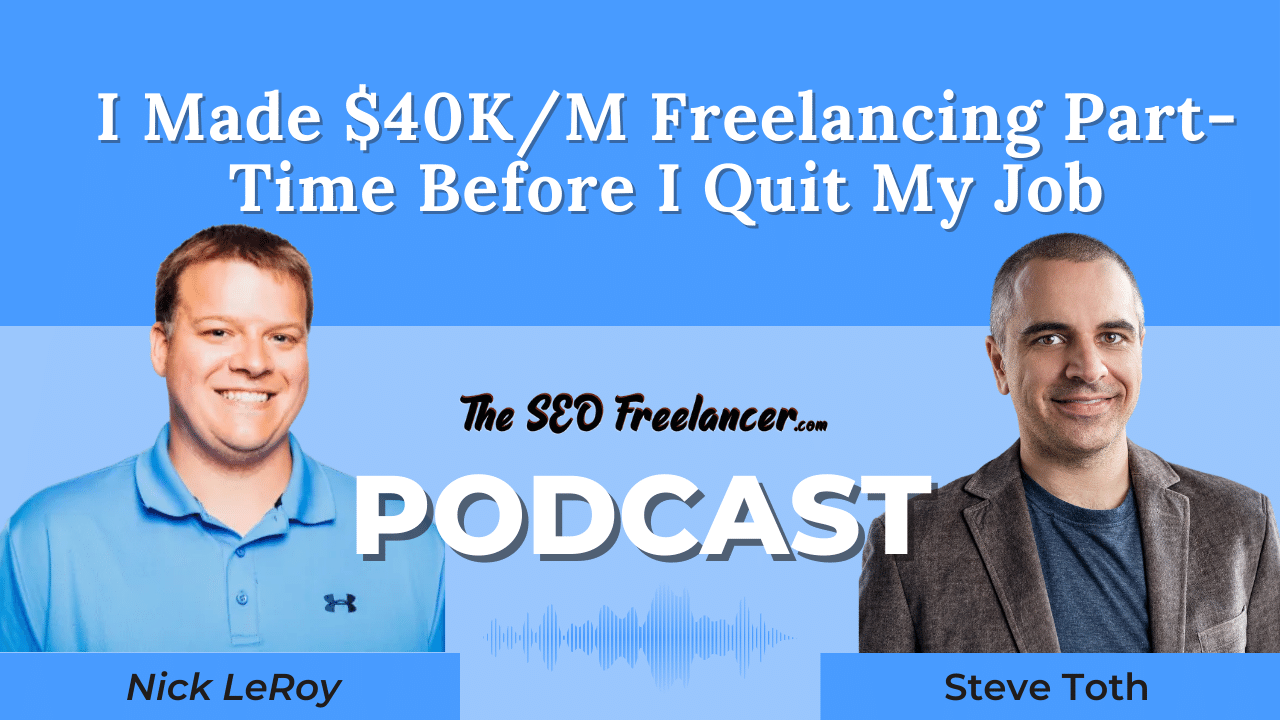


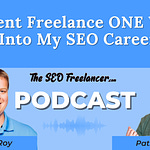
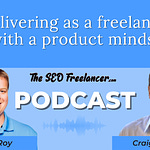
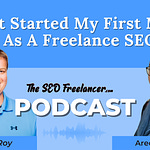
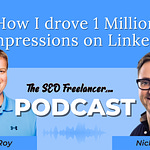
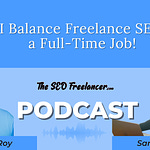
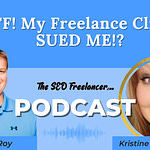
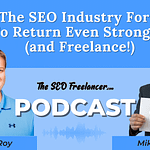
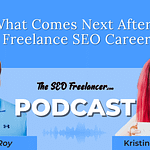
I Made $40K/M Freelancing Part-Time Before I Quit My Job